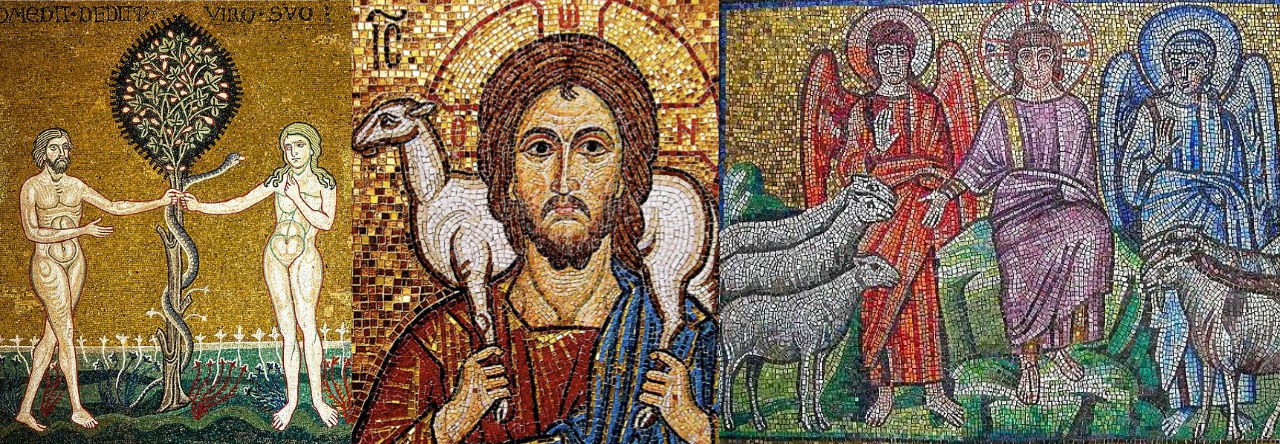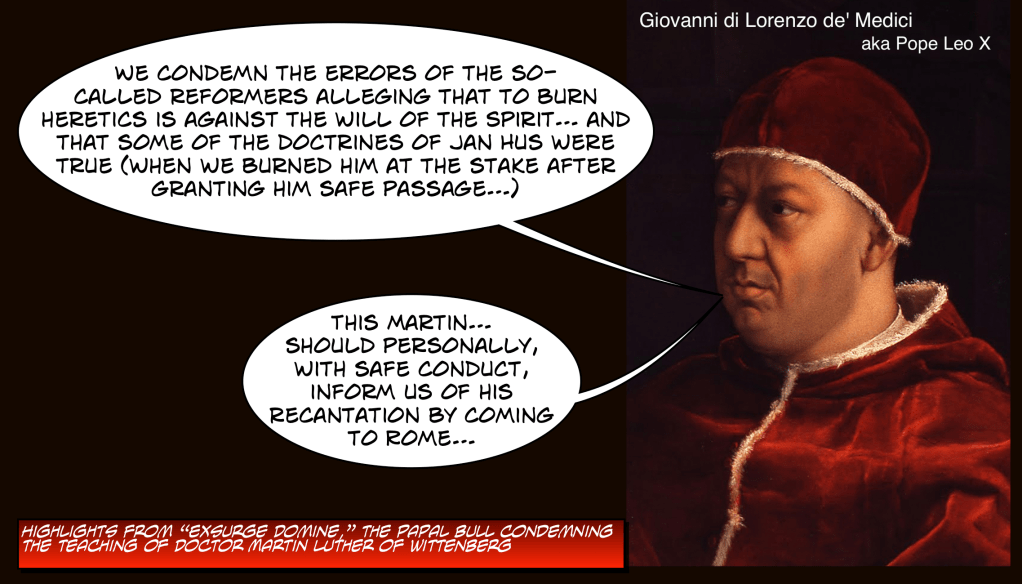I find it intriguing how so many Roman Catholics wonder why all Protestants don’t find “crossing the Tiber” irresistible. C.S. Lewis disappointed his good friend J.R.R. Tolkien by not joining him in that church.
As we prepare to commemorate another Reformation Day, I would like to share one of C.S. Lewis’ patient responses to that persistent query. In a moment we’ll read a letter Lewis wrote on this subject. Since some still ask the question,* it is important to set the stage for our consideration of this letter.
The letter which follows is part of an ongoing correspondence Lewis had with Peter Milward (1925-2017), a Jesuit priest. Milward had listened to some of Lewis’ lectures at Oxford, and had attended meetings of the Socratic Club.
Milward was among those who was amazed that such an enlightened Christian as C.S. Lewis could not recognize Roman Catholicism’s claim to be the true church. A number of Lewis’ letters to Milward are included in volume three of Lewis’ Collected Letters. (The same volume includes a succinct biography of Milward.)
Four years ago, I shared in Mere Inkling a letter Lewis had written to Father Milward. It related to the latter’s criticism of a point Lewis had (intentionally) not included in one of his books.
If you sometimes read into my books what I did not know I had put there, neither of us need be surprised, for greater readers have doubtless done the same to far greater authors. Shakespeare would, I suspect, read with astonishment what Goethe, Coleridge, Bradley and Wilson Knight have found in him!
Returning to today’s discussion, we have a letter written by the Oxford and Cambridge professor to the student who would become a professor and literary critic in his own right.
Why Lewis Remained a Mere Christian
Father Peter Milward asked C.S. Lewis during the final year of his life, to explain why he had not followed the natural path of Christian enlightenment into the embrace of Rome. Lewis provided a reasoned and considerate response, in the following letter, which I will allow to speak for itself.
As from Magdalene College, Cambridge
6 May 63Dear Padre
You ask me in effect why I am not an R.C. If it comes to that, why am I not—and why are you not—a Presbyterian, a Quaker, a Mohammedan, a Hindoo, or a Confucianist? After how prolonged and sympathetic study and on what grounds have we rejected these religions?
I think those who press a man to desert the religion in which he has been bred and in which he believes he has found the means of Grace ought to produce positive reasons for the change—not demand from him reasons against all other religions. It would have to be all, wouldn’t it?
Our Lord prayed that we all might be one ‘as He and His father are one.’ But He and His Father are not one in virtue of both accepting a (third) monarchical sovereign. That unity of rule, or even of credenda, does not necessarily produce unity of charity is apparent from the history of every Church, every religious order, and every parish.
Schism is a very great evil. But if reunion is ever to come, it will in my opinion come from increasing charity. And this, under pressure from the increasing strength & hostility of unbelief, is perhaps beginning: we no longer, thank God, speak of one another as we did even 100 years ago. A single act of even such limited co-operation as is now possible does more towards ultimate reunion than any amount of discussion.
The historical causes of the ‘Reformation’ that actually occurred were (1) The cruelties and commercialism of the Papacy. (2) The lust and greed of Hen[ry] 8. (3) The exploitation of both by politicians. (4) The fatal insouciance of the mere rabble on both sides.
The spiritual drive behind the Reformation that ought to have occurred was a deep re-experience of the Pauline experience.
Memo: a great many of my closest friends are your co-religionists, some of them priests. If I am to embark on a disputation–which could not be a short one, I would much sooner do it with them than by correspondence. We can do much more to heal the schism by our prayers than by a controversy. It is a daily subject of mine.
Yours
C.S. Lewis
Apparently Milward responded to this letter from Lewis, in which he must have further pressed the discussion about Lewis leaving Anglicanism. While Lewis remains courteous, his impatience with the matter is quite evident.
Dear Father Milward
Come, come! You show yourself lacking in the spiritual tact which is so conspicuous among my Jesuit friends in Oxford. Trying to goad a man into controversy when he has already declined it is not the way to convert him. Leave that to the Tee-Totallers and Pacifists who honour me with frequent letters.
Don’t you realise that if I were anxious for a disputatio I have among my friends many learned and delightful masters of your Church and even of your order, with whom the matter could be discussed at any length in comfort over a pot of tea or a pot of beer.
It is not likely I should prefer the manual labour (half my life is spent answering letters anyway) of a vast correspondence with a man at the other end of the world. Don’t you realise that my friends here wd. know the mollia tempora fandi (times favorable for speaking) a great deal better than you.
Peter Milward survived for five decades after Lewis passing. During those years he wrote many works, and in 1995 he penned A Challenge to C.S. Lewis. Fortunately, it was not a theological argument, but a critique of Lewis’ literary criticism. This is how the C.S. Lewis Institute “annotates,” the work: “Milward argues that Lewis fails to fully grasp medieval literature because he understands the background of medieval literature as pagan, rather than seeing the Catholic underpinnings.”
Not having read the book, I cannot comment on its merits. However, the following passage is of value for our present discussion. It is drawn from Milward’s 2013 review of a biography⁑ of C.S. Lewis.
Only when our correspondence came to an end . . . I came to put together my thoughts or feelings of “uneasiness” about the academic writings of Lewis in the form of a book entitled A Challenge to C.S. Lewis . . . I had always been perfectly at ease in reading his imaginative writings, even from Screwtape onwards, culminating in the Narnia stories, but I always had misgivings of various kinds on reading his academic writings.
And as I presented them in my book . . . I came to the conclusion that in his mind Lewis remained a Protestant till the end, with the “Ulsterior motive” he must have imbibed with his mother’s milk, whereas at heart he was at once Pagan and Papist, encouraging many a Catholic . . . to wonder when he would follow Newman and Chesterton on the path to Rome. Nor did he live to take up my challenge, having no doubt passed to what Shakespeare calls “a better life, past fearing death.”
Postscript
Some Roman Catholics have argued that, given the radical changes in Western Anglican theology, Lewis would have joined their denomination had he lived long enough. Such is the contention on a thought provoking article that explores a number of prominent Roman Catholic converts who credit C.S. Lewis with influencing their personal pilgrimages to Rome.
* A 2013 consideration is found in C.S. Lewis and the Catholic Church, written by the Director of the Center for Faith and Culture at Aquinas College.
⁑ Milward was reviewing Alister McGrath’s C.S. Lewis: A Life, in volume 54 of Heythrop Journal. He offers a number of insights into his own relationship with Lewis throughout the review.


*sigh* why can’t some people do as the Catholic brother Richard Rohr and find some truth in all paths? It’s very arrogant to assume that you are on the right path and others the wrong, as this current Pope would no doubt agree
Well, Sarada, I think we are all on the particular path we follow precisely because we believe it to be “true.” Some of those paths claim absolute exclusivity, and these by definition cannot affirm truth in “all” avenues. However, Roman Catholicism has long affirmed that–even though it professes to be the purest route–there are other communions (e.g. Orthodox churches) that are also Christian.
As diverse as humanity is, I doubt we will ever find agreement on epistemology.
The best we can hope for, it seems to me, is to exercise mutual respect. I love dialoguing with people from other perspectives. I honestly desire to hear them. Lewis was like that. He didn’t want people to parrot back his own views.
But his patience had limits. Which is a trait most of us share.
I enjoyed reading this very much. As always Lewis’s patience even towards obstreperous correspondents never ceases to impress, this in the last year of his life.
Glad you enjoyed it, Dora. And thanks for your long friendship with Mere Inkling… you are one gloriously unobstreperous companion in this pilgrimage of learning.
How kind, Rob! So glad we’re fellow pilgrims.😊
Ditto.
I find this amusing from the (quite young, comparatively) perspective of LDS peers who presume to assume Lewis would surely join *them*.
I certainly have noted the large number of LDS apologists who yearn to claim Lewis as one of their own. There certainly are some parallels.
I suspect most of us have the tendency to feel like those we respect are more similar to us than they actually are.
True, although ’tis also true we are more similar than we claim.
Yes. I think that there are two basic perspectives: those who perceive the similarities in others and those whose natural default is to look for the differences.
Rob,
I really think issues arise when people get locked into the credos and issues of reglion and not faith. It might be tough for a staunch Baptist to enjoy or recommend a Calvary Chapel Pastor’s book for fear of someone joining a CC fellowship. But people who walk with Christ know He works though people of faith in different branches of Christian faith.
Thanks, Gary
The Christian Church is truly much larger than most of us think. Many find it useful to think in terms of the visible and invisible Church.
The visible Church being all those who profess membership, or (in nations with a state church) who do not formally elect to be unconnected.
The invisible Church being those who are truly part of what Paul describes as the Body of Christ.
As always, interesting and informative.
Thank you, Anna. But you left out “calorie-free!”
C.S. Lewis is my favorite nonfiction writer. Thank you for such an interesting post.
Glad you enjoyed it. Have you checked out Lewis’ fiction? Aside from the Chronicles (more of fantasy type stories) he wrote a space trilogy. He wrote some other fictional stories, but not the traditional fiction you may prefer. Nor did he write detective stories or mysteries, as did some of his friends.
Pingback: C.S. Lewis, Puritanism & Prudes « Mere Inkling Press
My Jewish ancestors used to belong to the church of Moses and that was some church!The church of Rome is not any different. That’s why i love it so much!
Now that an endorsement in a form I’ve never heard, Thomas! Blessings to you.
Pingback: Mere Christianity: by C.S. Lewis. Reviewing a Classic | Veracity
Pingback: A Portuguese Pope & C.S. Lewis – Mere Inkling Press